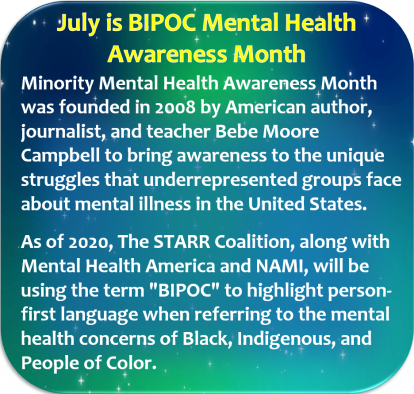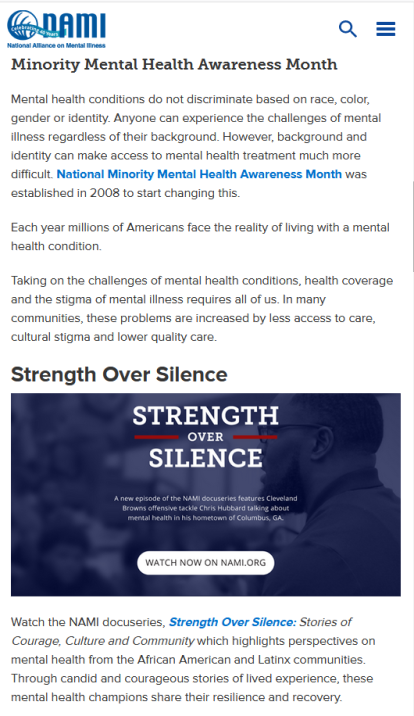- Themes for BIPOC Mental Health Awareness Month:
- Importance of BIPOC mental health / brain health research
- Stigma reduction: Mental health conditions do not discriminate based on race, color, gender or identity.
- Hashtags:
- #BIPOCMentalHealthAwareness, #BIPOCMentalHealthAwarenessMonth
- #MentalHealthConditionsDoNotDiscriminate
- #BreakTheStigma
- Posts to include:
- visuals – both static and animated
- BIPOC mental health stats and factoids
- stories
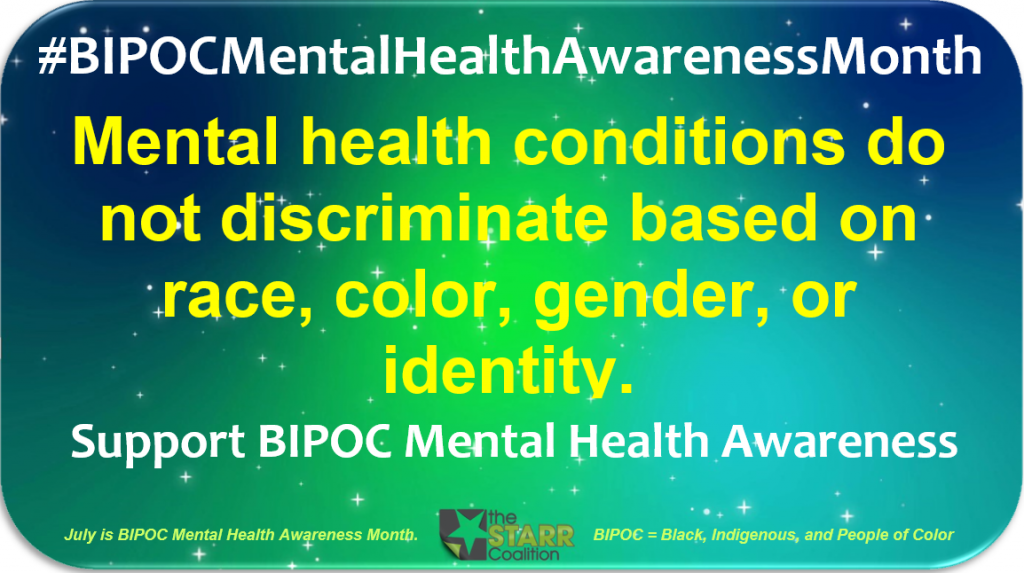
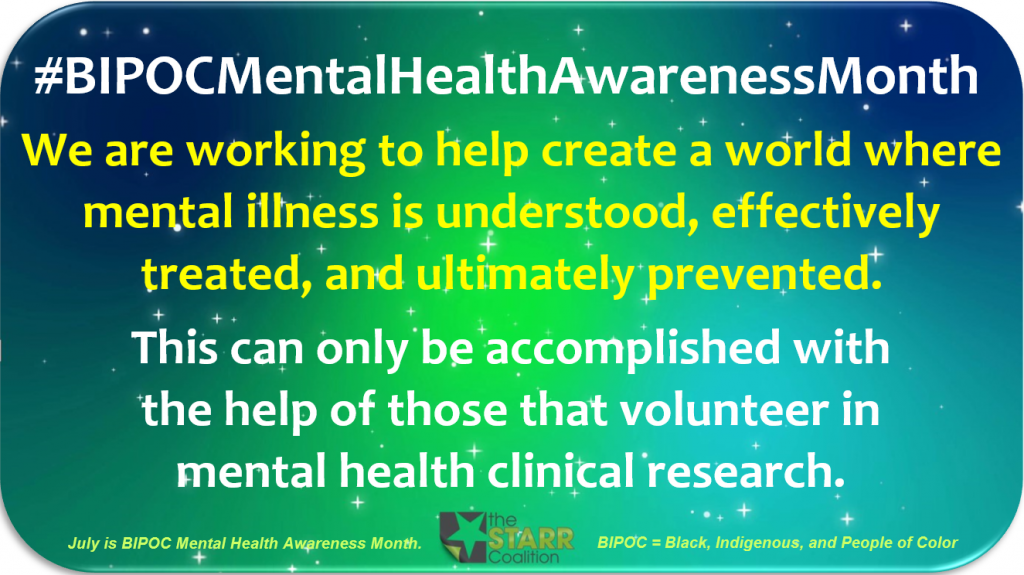
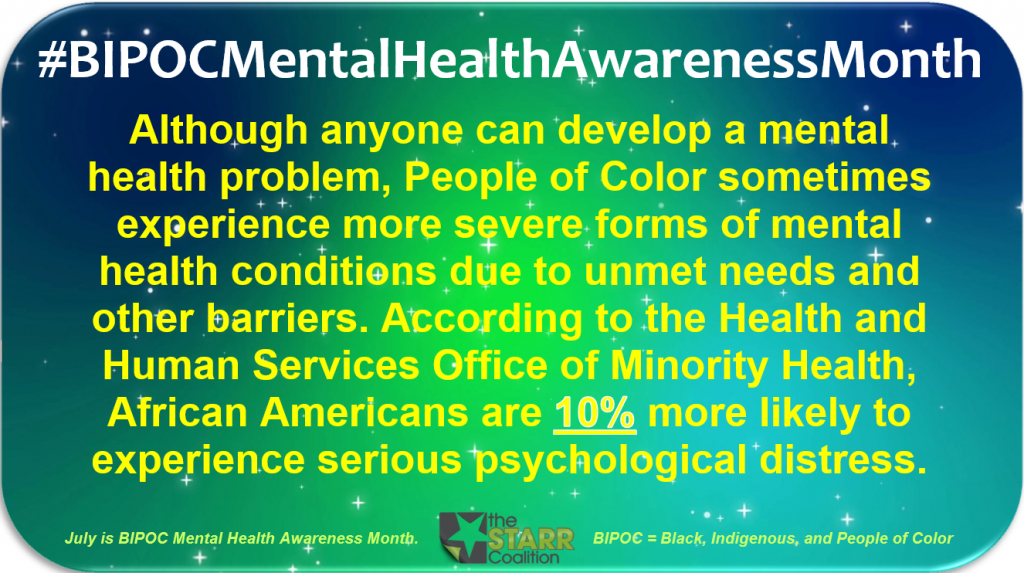 700
700
Minority Mental Health Awareness Month was founded in 2008 by American author, journalist and teacher Bebe Moore Campbell to bring awareness to the unique struggles that underrepresented groups face in regard to mental illness in the United States. As of 2020, Mental Health America and NAMI will be using the term “BIPOC” to highlight person-first language when referring to the mental health concerns of Black, Indigenous, and People of Color.
Mental health conditions do not discriminate based on race, color, gender or identity.
Although anyone can develop a mental health problem, African Americans sometimes experience more severe forms of mental health conditions due to unmet needs and other barriers. According to the Health and Human Services Office of Minority Health, African Americans are 10% more likely to experience serious psychological distress.
African Americans, like many minority communities, are also more likely to experience socioeconomic disparities such as exclusion from health, educational, social and economic resources. These disparities may contribute to worse mental health outcomes.
Approximately 30% of African American adults with mental illness receive treatment each year, compared to the U.S. average of 43%.
Historically, African Americans have been and continue to be negatively affected by prejudice and discrimination in the health care system. Misdiagnoses, inadequate treatment and lack of cultural competence by health professionals cause distrust and prevent many African Americans from seeking or staying in treatment.
African Americans are 20 percent more likely to experience mental health issues than the rest of the population
Native Americans between the ages of 18 and 24 have the highest suicide rates of any ethnic group, and 40 percent of the individuals who die by suicide are between 15 and 24 years old
Only 2.3 percent of black or Hispanic young people see someone for mental health issues every year compared to 5.7 percent of white children
Black and African American people are more often diagnosed with schizophrenia and less often diagnosed with mood disorders compared to white people with the same symptoms. Additionally, they are offered medication or therapy at the lower rates than the general population. [Source: American Psychiatric Association. (2017). Mental Health Disparities: African Americans. Retrieved from https://www.psychiatry.org/File percent20Library/Psychiatrists/Cultural-Competency/Mental-Health-Disparities/Mental-Health-Facts-for-African-Americans.pdf]
One in five Americans suffer from mental illness. African-Americans are the least likely population to seek treatment. We were taught to hold our problems close to the vest out of fear of being labeled and further demonized as inapt, weak, and/or inadequate. African-Americans also have a history of being misdiagnosed, so there is mistrust associated with therapy. Source: https://borislhensonfoundation.org/
Mental Health America understands that racism undermines mental health. Therefore, we are committed to anti-racism in all that we do. This means that we pledge to work against individual racism, interpersonal racism, and institutional racism in all their forms. Source: https://mhanational.org/issues/black-and-african-american-communities-and-mental-health
“Unrest over social injustice spotlights the acute need for, and the high historical barriers to, mental health treatment for Black people facing layers of emotional pain.” ‘Bear Our Pain’: The Plea For More Black Mental Health Workers: [https://n.pr/2NDx28d] via @NPR
“This is the only medical illness that we use criminal justice to respond to.” Police Are the First to Respond to Mental Health Crises. They Shouldn’t Be: [https://bit.ly/2BfCxYd] via @vicenews
“This is a national crisis. Mental illness is something we have to address by talking about it. Many times, Black families are fearful of being characterized as weak or inadequate, so we keep it to ourselves. I’m not keeping it to my self.” https://www.beaconjournal.com/news/20200621/family-experience-drives-quest-to-help-people-facing-mental-health-issues
COVID-19 is a public health crisis. Racism is a public health crisis. These two crises pose a significant risk for Black Americans’ mental health. https://www.rollcall.com/2020/06/17/virus-racism-pose-more-mental-health-risks-for-black-americans/
A mental health provider shortage has been documented nationwide. Health Resources and Services Administration data released in March found that only about 27 percent of geographic areas have enough mental health practitioners. https://www.rollcall.com/2020/06/17/virus-racism-pose-more-mental-health-risks-for-black-americans/



 700
700